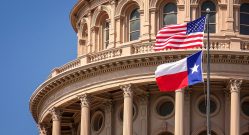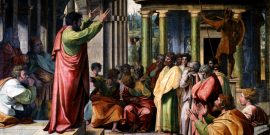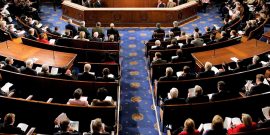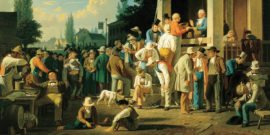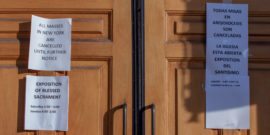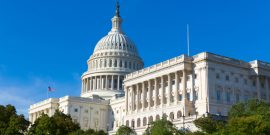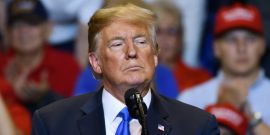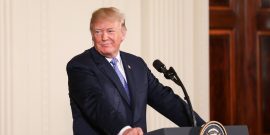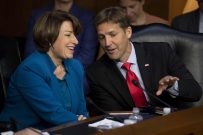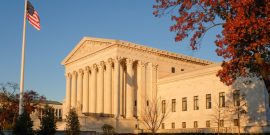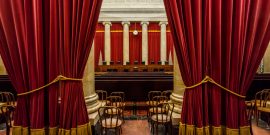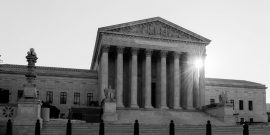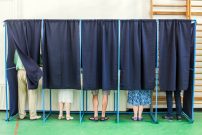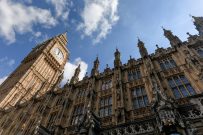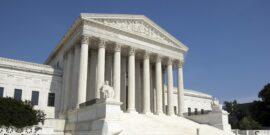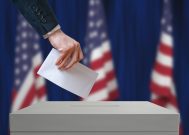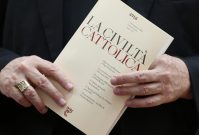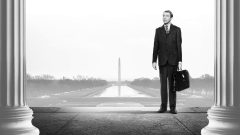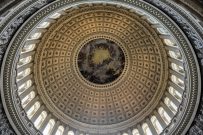The legal dispute between DHS and Texas has a number of moving parts that have been lost in the hyperbolic public discussion.
James R. Rogers
What happens when worship is directed towards the mystical body of representative government?
The Court arrived at the right decision in Moore v. Harper, but it still muddied the waters surrounding the independent state legislature theory.
A revival of the privileges or immunities clause would not necessarily lead to heightened scrutiny of economic regulation.
West Virginia v. EPA signals that the Court has reached the limit of its willingness to reconsider and revise its delegation doctrines.
The esteemed economist's Great Transformation doesn't speak to the present moment in the way anti-liberals would have us believe.
Anne Elliott is an example of a heroine who would, out of conscience, defer even to a wrong decision of those in authority.
The National Conservatism "Statement of Principles" looks exclusively to the political, and not to the religious, for social redemption.
The liberal/postliberal dualism is too simplistic, requiring that we see disagreement where there may in fact be none.
Discussion of police powers and the common good is useful and necessary for Americans today.
How do the state constitutions differ from one another and from the U.S. Constitution?
The idea that Christianity ushered in an age of individualism misses the nature of the church.
It is imperative that American policymakers and citizens learn from the failures and successes of the COVID-19 pandemic.
Have we learned anything from Covid-19 that will help us prepare for the future?
Which legal arguments against OSHA's COVID-19 vaccination mandate are most likely to succeed?
Is the obsessive focus on material gain among all classes of Americans self-destructive?
Since humans are created in the image of God, they possess dignity, which has implications for freedom—including economic freedom.
Does the continuation of racial economic and social disparities in society mean America is racist?
Most people just don't think there's much moral nobility in taking from the rich simply because they're rich.
God’s Law and Order claims that evangelicals are responsibile for the rise and maintenance of the American system of mass incarceration.
When scholars teach that “everything is political,” they can’t really be surprised when the same lens is turned to assess their own work.
In Calvin Coolidge the nation had an uncommonly perceptive, and distinctively American, mind in the White House.
Any suggestion of caution in policy responses last year in response to the developing pandemic was met with an unwarranted chorus of denunciation.
Witt’s analysis predicts that US governmental responses to COVID would disproportionately burden the poor, but he does not apply his own logic far enough.
Founding God's Nation shows that Exodus is not merely a story of "national liberation, political founding, and decent interpersonal morality."
Over 20 years before Gingrich, Democrats implemented reforms intended to shift the House of Representatives in a decidedly liberal direction.
What information and what warnings should government disclose to the public, and why?
There is good reason to think that impeachment remains on the table, even after politicians leave office.
The dispute over in-person congregational worship in light of COVID is a dispute between two governments that share power over their citizens.
Christakis's hurried book sheds little new light on the pandemic, and ends up repeating the shibboleths of intervention when humility is what we need.
Policy inertia means that the Republican Party of 2024 will share more with the Republican Party of 1924 than that of more recent decades.
Emma’s remarkable virtue is revealed all the more through her quite serious vices.
Rather than being opposites, markets are a superlative form of regulation.
The myth of America’s stateless past can be entertained only by ignoring the experience of the U.S. states and the exercise of their vast police powers.
We ought not talk as if COVID alone caused the recession.
Three recent cases challenge the statutory and constitutional bases of legislative delegation to executive branches.
Models can provide a useful picture of what we think is happening in the world, but scientists place too much trust in them.
Stasavage puts his thumb on the scales in favor of democracy but misses the possible virtues of autocracy in his comparative theory.
The American public’s current skepticism derives from the belief that experts are abusing the deference their expertise is due.
One might be forgiven for thinking that today’s Republican Party is an American Christian Democratic party in everything but name only.
The constitutional reasonability of today’s requirements are more constitutionally doubtful than many believe.
For Piketty, the Hayekian turn in the 1980s was a long planned ideological triumph, but his narrative omits certain crucial details.
Why do socialists ignore the one story in Scripture that depicts real socialism?
One judge’s arbitrary legislation is another judge’s legitimate public purpose.
If you listen to Democrats and their cheerleaders in the mainstream media, their leaders are just plain smarter and more caring.
Passing off convenient faux-interpretations with a wink and a smirk is a short-term remedy with a long-term cost to political culture.
The frenetic pace and consumption-focus of American economic life is not a result of market capitalism, but it may be part of the American character.
The question is not the existence of tradeoffs, but whether the necessity of making tradeoffs will be honestly acknowledged or dishonestly denied.
Minimaxing carries with it its own costs, and those costs might very well turnout to be greater than the costs of draconian coronavirus policy.
Lind seems to have a picture in his mind of a more cooperative, more Tocquevillian America, but he endorses means that would be immensely destructive.
Despite Gornick's good intentions, the painful end of the Communist romance dominates her book from start to finish.
We don't live in a classically liberal economy, so why should we critique labor unions as if we do?
Holding up Hayek for abuse allows both right and left postliberals to substitute ideological argument for data and analysis of specific policies.
Whether we are trying to account for government failure, or market failure, we shouldn't double count costs.
The irony is that the problem with Reno’s argument is the problem that Reno identifies as liberalism's fatal flaw, the absence of particularity.
Modern antiliberals on both the right and the left must account for the benefits of markets, and recognize our tragic choice.
Eugene McCarraher's Enchantments of Mammon seeks to unveil capitalism and recapture a premodern sense of the world as sacramental.
It makes sense why stagnation rhetoric is so common, but the facts don't support it.
The roots of Western liberalism both precede, and go far deeper, than Martin Luther and his influence.
The structural guarantee of the Establishment Clause can be preserved even with protections that prevent restricting individuals' religious liberty.
The Senator's embrace of Catholic teaching offers some promise, but needs more depth.
The modern Church, having drunk deeply the kool-aid of Platonism (and epicureanism) set the foundation for much of her own irrelevance and insipidity.
Originalism is a theory of constitutional interpretation, it is not—nor can it be—a constitutional theory in itself.
The normative justification for originalism—honest reading—is compelling and causing cracks in the once solid wall of opposition to originalism.
The Bible teaches first that God, and not the nations, is sovereign over national borders, and yet, nations have a real purpose.
Brown is exactly right on the reality of the social. Her cure, however, is to introduce more of the disease rather than the remedy.
If Hazony's traditions are just accidents of cultural evolution or history, then we’re back to full blown relativism.
Childress implicitly frames the problem of adjuncts as a problem of markets and neoliberalism, but this misses the point.
It did not cause the erosion of subsidiarity in American life, but neither is it a remedy for that erosion.
We can’t recover both economic localism and personalism to any significant degree and still maintain anything close to modern living standards.
Oxfam is reluctant to consider a troubling question: What if global poverty declined because economic inequality increased?
The ironic result of the Federalists' efforts is that the increase in national power could actually increase overall liberty for the country.
Thinking through the logic of the Constitution with public choice theory in mind leads to some counter-intuitive results.
Initial steps down the path of equalitarianism in turn create their own momentum, picking up speed and insisting on ever more conformity.
One can certainly hope for the best in Sudan, but the liabilities the country faces in transitioning to peace, let alone to democracy, remain sizable.
The problem with the Christian Right is not that it’s too Christian, but rather that it’s not Christian enough.
It is Trump judges who would allow states to do just what the Illinois Senate wants to do in SB0145 as it seeks to prevent Trump’s reelection.
Without Trump in play, the pre-existing party system will snap back into place with issues and coalitions little altered.
The irony is that the problem is actually more mundane than the continuing existence of racial animus, and the fixes aren’t really all that complicated.
Riker and Weingast argue in the Virginia Law Review that social choice theory’s “chaos theorem” augurs for heightened judicial review.
The inculcation of the humble spirit of true science in the study of politics is a good thing.
Congress faces an inherent collective action problem relative to the President, one that means legislators underinvest in the institution itself.
If the right to liberty is alienable, whether despotic rule is just or unjust depends on the actual set of agreements between the people and their ruler.
What’s important about the gold standard is the discipline it provides to support price stability.
The desperate fear that motivated parents' behavior extends far wider than these elites—it offers a glimpse of the dark side of America’s democratic soul.
It's not 1964 anymore: the media are often the deep-pocketed parties in disputes over defamation rather than government officials or private citizens.
Justice Black’s “absolutist” reading of the First Amendment, while celebrated, is not consistent with the actual text of the First Amendment.
A reasonable reading of the U.S. Constitution’s preamble identifies how “general welfare” differs from its meaning in any given state constitution.
Identity would seem on socialist terms to prevent the achievement of fundamental socialist aims rather than to advance them.
In Marxist and socialist anthropology, people generally would mimic the behavior only of virtuous aristocrats.
Perhaps we should be with the socialists on this one: NYC did not lose much in net by Amazon’s pullout.
President Trump’s declaration of a national emergency is the check on executive prerogative, not the exercise of it.
Once we indulge the taste to take away simply because others have, there is no end but desolation.
Consent is no longer understood as something others undertake on our behalf, but without comprehending the old view, much about the past is unintelligible.
In By Birth or Consent, historian Holly Brewer does nothing less than trace the evolution of the central postulate of liberalism from theory to practice.
If the disappearance of good manufacturing jobs leads to a decrease in blue-collar marriage rates, wouldn't the opposite be true as well?
When conservatives blame markets for illnesses generic to all modern economies, they misdiagnose the cause and therefore prescribe faulty remedies.
Let's conduct a thought experiment: when you blame markets for a bad outcome, ask yourself whether a planned regime would suffer the same results.
One can concede the ills Carlson identifies without conceding that the “free market” caused those ills.
For better or for worse, the increasing political polarization and extremism we see today is no more than a reversion to the American norm.
If we ask what was the greater source of violence in the 20th century, secularism has to trump religion every time.
Empires are part of the Old Testament plan for reconstituting humanity and repealing the judgment at Babel.
If anything, Lutheran and Reformed (i.e., “Calvinistic”) churches share the religious universalism of Roman Catholicism.
It’s easy to imagine suburbanites, even large numbers of women, preferring the Trump they know to the socialist they don’t.
In the film Stranger than Fiction, Will Ferrell tests the proposition that a man should be willing to die for beauty.
Maps are highly stylized, unrealistic models of real topography, and they share key traits with the theories we use to grapple with reality.
Critics love behavioral economics because they think it gives traditional economics the comeuppance it deserves, and this is a mistake.
Government grants monopoly power all the time, but how can we determine when it's good, and when it's bad?
Bush never caught on to the fact that a growing number of Republican voters expected Republican politicians actually to change the rules.
It would be ironic if American politicians were insufficiently ambitious to sustain a system predicated on “ambition counteracting ambition."
For Centinel, it wasn't institutional design that could maintain republican liberty—only public virtue would do.
Crony capitalism is by definition politically-connected capital, and monopoly follows from it.
We need not pretend that constitutional and legal philosophies do not map consistently onto substantive political outcomes.
People frequently assume social and economic liberalization goes hand in hand, but the links aren't as tight as we often assume.
The Declaration’s affirmation of inalienable rights limits individual autonomy, but it does so in the service of liberty.
Electoral accountability of the executive branch is the reason the Constitution vests executive power in an elected president in the first place.
Despite all appearances, the Democratic takeover of the House increases the odds of Trump’s reelection in 2020.
As with Adam Smith’s tradesmen, we don’t want a fully cartelized economy. We want to cartelize our part of the economy
If Americans no longer desire birthright citizenship, then the means to implement that desire is to amend the Constitution.
The Western experience with increasing economic inequality cannot be generalized worldwide.
The end of the 19th century brought a curious political obsession to the forefront of U.S. politics, and The Wizard of Oz was one result.
The inclination to bond with one’s nation-state, and regard it as primary, is a reflection of the absence of real community in America.
Each film carries the theme effortlessly, almost unexpectedly, and in so doing, each film punches with unexpected power.
Truth breaks into life in pulverizing ways, and this is something Robert Duvall shares with Flannery O'Connor.
Twisting orignalism and textualism into blunt tools isn't fair or representative of how scholars and judges think about legal texts.
There is no crisis of legitimacy for the Supreme Court among the American public as a whole, but liberal elites will tell a different story.
Has the explosive growth of modern economies left the value of domestic work in marriage behind?
The rise of the textile industry did not of course single-handedly transform traditional family life, but it could not help but disrupt traditions.
To be sure, Tocqueville’s tradeoffs are incommensurable—they are tragic in the sense that we cannot have more of both.
Modern levels of the division and specialization of labor cannot be “solved” without inconceivably huge economic and social dislocations.
Ironically, sometimes too much power hinders one’s ability to achieve what one desires.
Authoritarian rulers need to implement laws as much as non-authoritarians do, and that means judges have more independence than you might think.
Senator Sasse asks: Are there ways for Congress to answer its need for administrative expertise without losing electoral accountability?
It is a good thing a U.S. Senator raised the delegation issue in a high-visibility venue, but it should have a hearing of its own.
The Bostonians was a reactionary novel even in the day it was written, and this is exactly why college students should read it.
Robin celebrates socialism as “freedom from rule by the boss,” but is being ruled by bureaucrats better?
The liberty of the agrarian yeoman would not at all resonate with Corey Robin’s desires for socialist freedom.
The ability of Congress to choose between administrative systems weakens the separation-of-powers system.
Footnote 4 of Carolene Products and the "counter-majoritarian difficulty."
United States v. Lopez never presaged a huge rollback in national power: why is this?
We normally think of judicial review of legislation as a zero-sum game, but it has unseen benefits.
Americans should argue with Madison, but we should also take his words seriously when we do so.
Publius makes persistent appeal to self-interest throughout The Federalist: what does this tell us about human nature?
What to make of Hamilton and Madison's darker thoughts on human nature as they appear throughout The Federalist?
The Supreme Court is independent, yes, but Congress has several options for exercising control over the justices.
Is there something peculiar going on in the way Federalist 9 transitions into Federalist 10?
With Justice Kennedy's retirement, the new holder of the balance on the Supreme Court is Chief Justice John Roberts.
“Tribalism” motivates a lot of partisan behavior, but there are many other factors—including policy preferences—involved.
Isn't it possible that the rational voter model can be amended to account for civic virtue?
Critics of rational choice theory in general and the rational voter model in particular misunderstand what it implies.
Tangible rewards for offering location incentives are obvious for all local governments, but that doesn't make the practice any less problematic.
By letting the judiciary offer advisory opinions on legislation, we might not just save time but also get better legislation.
It might be helpful that President Trump has switched up how the game is played with North Korea.
State supreme courts could easily use their advisory capacity, but it's important to fully consider the costs and benefits.
While the U.S. Supreme Court has declined to issue advisory rulings, some state courts embrace this power.
It is simply too pat to point to bare economic inequality and decry it as necessarily unjust: pursuing equality can often harm growth.
Oeconomicae et Pecuniariae offers important insights not just for Catholics, but for anyone interested in a moral understanding of economics.
We need to move beyond naive attitudinalism and recognize that judges have preferences, but that these don't entirely control judicial decision-making.
Carefully assessing judicial politicization gives us fresh reasons to doubt the attitudinal model.
Attitudes may matter more than originalists would like to admit, but we shouldn't discount the possibility of principled judging.
America's civil religion narrows real religion in unfortunate ways.
Avoiding chaos isn't everything: policy stability or instability is less relevant than the content of policies that are stabilized or destabilized.
Rational choice theory might help explain why James Madison thought a little chaos could be good for democracy.
A Beautiful Mind is a great film, but the one example it provides of game theory is misleading.
Many have the story of Moneyball wrong: it's not a story of systematic error but one of eliminating systematic error in a market.
Tocqueville gives us good reasons to think that constitutional amendment is the best path to avoiding judicial supremacy.
When legislators know that judicial review will save them from hard calls about the laws they vote on, no end of mischief follows.
Is it possible that the courts - one of our most important "auxiliary precautions" - are undermining republican liberty?
Trump’s core base values Trump’s grotesquerie not because they, too, are grotesque, but precisely because they are not.
Richard Spady's account of economic growth reminds us of the tensions between domestic growth and development abroad, but the path forward isn't clear.
In "Economics as an Ideology," Spady explores the ways thinking about romance economically can remind us that not all choice is good.
Although he doesn't intend it, Richard Spady offers renewed economic reasons to reject First Things' turn against free trade.
Government borrowing creates intergenerational conflicts our system wasn't built to handle, but how do we curb debt?
Anne Case and Angus Deaton have published important studies on increasing mortality in white men, but caution is in order when linking deaths to despair.
Conservatism should help us negotiate the tragic tradeoffs of life: a way between market and political liberalism versus solidarity. Tocqueville can help.
Looking closely at voter turnout patterns tells a mixed story about Republicans' chances for victory in the midterms and beyond.
Reading legal texts doesn't put us in a different interpretive world: we should always embrace honest textualism.
One knows it’s a strange, new political world in the US when Paul Krugman attacks a Republican President from the right on the subject of tariffs.
Judicial impeachment may feel good at the time, but any partisan advantage pretty much washes out over the long run - but better options exist.
The dormant commerce clause doctrine has allowed the judiciary, by itself, to create and sustain a nation-wide free trade zone in the U.S.
The Preacher in Ecclesiastes says the end of a matter is better than the beginning. Not for Britain in World War II, however.
To justify the liberal arts, we have to use language deeper than utility.
For many people today, education simply signals their employability. By recognizing this, Bryan Caplan has made himself many enemies.
Jeremy Bentham asserted that an attachment to bicameral government reflected a blind veneration of tradition, but he missed something about America.
There are many roads to liberalism, and not all liberalisms are about the deepest questions.
Trade-offs are inescapable: the separation of powers encourages informational free riders and can make good policies harder to achieve.
Heightened judicial review of economic life can't be justified if the judiciary avoids treating government action the same way.
For the most part, government competition for business is good, but we should consider whether the Amazon HQ2 competition distorts the market.
The need to correct errors or interpret technical language doesn't impede honest reading - originalism actually requires we do both.
Originalism is the way we all want to be read, so why doesn't it have more adherents?
Brown v. Board is one of the most important decisions of the 20th century, but it rests on deeply confused logic.
Textual originalists can disregard original intent - and that's a good thing.
Our bureaucracy seems to move further and further from legislative accountability, but what explains this?
In many senses the Evangelical movement has been wildly successful, but today's churches face an unexpected challenge in moral education.
America could never sustain indefinitely its tremendous commercial and military power achieved in the 1950s.
If globalization becomes a defining issue for different camps of conservatives, it’s difficult to see the continuation of the American conservative coalition.
The judge is always caught in an intricate dance of power between opinion and the Constitution.
The increase in political polarization in this country reflects the decreasing sectional attachments that rose from the Civil War.
Increases in divisions of labor have produced material prosperity that would have beggared the minds of the ancients.
Does the process of market creation fully price the cost of that creation?
Aristotle reports an ancient example of rational choice theory in international affairs.
State constitutions have more explicitly attempted to stop factious legislation relative to the national constitution.
Responding to First Things criticisms of Michael Novak.
Socially, a community can create a better future for itself, as it were, by tying its hands today.
What to do with populations in which we can identify threats ex ante only probabilistically?
Why would an anti-immigrant movement overlook what would seem to be the most direct route to reduce unwanted immigration?
We underestimate today the seriousness with which Americans initially took the idea of corporate consent.
As a political scientist, I’ve never liked the name of the discipline. I certainly don’t think of myself as a “scientist.”
James R. Rogers is Associate Professor of Political Science at Texas A&M University and Contributing Editor at Law & Liberty. He holds a J.D. as well as a Ph.D., and teaches and publishes at the intersection of law, politics, and game theory. He has published articles in the American Journal of Political Science, the Journal of Law, Economics, and Organization, Public Choice, and in numerous other journals. He edited and contributed to the book Institutional Games and the Supreme Court, and served as editor of the Journal of Theoretical Politics from 2006 through 2013.










